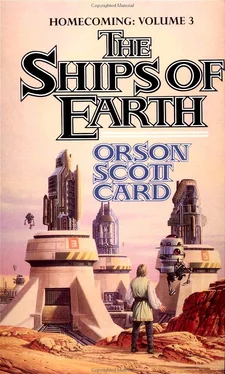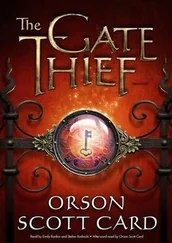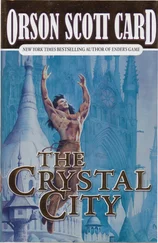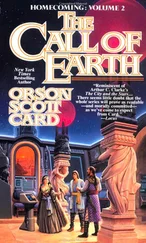Orson Card - THE SHIPS OF EARTH
Здесь есть возможность читать онлайн «Orson Card - THE SHIPS OF EARTH» весь текст электронной книги совершенно бесплатно (целиком полную версию без сокращений). В некоторых случаях можно слушать аудио, скачать через торрент в формате fb2 и присутствует краткое содержание. Жанр: Фантастика и фэнтези, на английском языке. Описание произведения, (предисловие) а так же отзывы посетителей доступны на портале библиотеки ЛибКат.
- Название:THE SHIPS OF EARTH
- Автор:
- Жанр:
- Год:неизвестен
- ISBN:нет данных
- Рейтинг книги:4 / 5. Голосов: 1
-
Избранное:Добавить в избранное
- Отзывы:
-
Ваша оценка:
- 80
- 1
- 2
- 3
- 4
- 5
THE SHIPS OF EARTH: краткое содержание, описание и аннотация
Предлагаем к чтению аннотацию, описание, краткое содержание или предисловие (зависит от того, что написал сам автор книги «THE SHIPS OF EARTH»). Если вы не нашли необходимую информацию о книге — напишите в комментариях, мы постараемся отыскать её.
THE SHIPS OF EARTH — читать онлайн бесплатно полную книгу (весь текст) целиком
Ниже представлен текст книги, разбитый по страницам. Система сохранения места последней прочитанной страницы, позволяет с удобством читать онлайн бесплатно книгу «THE SHIPS OF EARTH», без необходимости каждый раз заново искать на чём Вы остановились. Поставьте закладку, и сможете в любой момент перейти на страницу, на которой закончили чтение.
Интервал:
Закладка:
"Who else can I take it out on?" said Issib, smiling wanly.
"The Oversoul. Tell your chair to throw the Index across the room."
Issib shook his head. "The Oversoul would simply override my command. And besides, the Index isn't the Oversoul, it's simply our most powerful tool for accessing the Oversoul's memory."
"How much does it remember?"
Issib looked at her for a moment. "You know, I never thought you'd refer to the Oversoul as it."
Rasa was startled to realize she had done so, but knew at once why she had done so. "I wasn't thinking of her— the Over-soul. I was thinking of it— the Index."
"It remembers everything," said Issib.
"How much of everything? The movements of every individual atom in the universe?"
Issib grinned at her. "Sometimes it seems like that. No, I meant everything about human history on Harmony."
"Forty million years," said Rasa. "Maybe two million generations of human beings. A world population of roughly a billion most of the time. Two quadrillion lives, with thousands of meaningful events in every life."
"That's right," said Issib. "And then add to those biographies the histories of every human community, starting with families and including those as large as nations and language groups and as small as childhood friends and casual sexual liaisons. And then include all natural events that impinged on human history. And then include every word that humans ever wrote and the map of every city we ever built and the plans for every building we ever constructed…"
"There wouldn't be room to contain all the information," said Rasa. "Not if the whole planet were devoted to nothing but storing it. We should be tripping over the Oversoul's data storage with every step."
"Not really," said Issib. "The Oversoul's memory isn't stored in the cheap and bulky memory we use for ordinary computers. Our computers are all binary, for one thing—every memory location can carry only two possible meanings."
"On or off," said Rasa. "Yes or no."
"It's read electrically," said Issib. "And we can only fit a few trillion bits of information into each computer before they start getting too bulky to carry around. And the space we waste inside our computers—just to represent simple numbers. For instance, in two bits we can only hold four numbers."
"A-1, B-1, A-2, and B-2," said Rasa. "I did teach the basic computer theory course in my little school, you know."
"But now imagine," said Issib, "that instead of only being able to represent two states at each location, on or off, you could represent five states. Then in two bits—"
"Twenty-five possible values," said Rasa. "A-l, B-l, V-1, G-1, D-1, and so on to D-5."
"Now imagine that each memory location can have thousands of possible states."
"That certainly does make the memory more efficient at containing meaning."
"Not really," said Issib. "Not yet anyway. The increase is only geometric, not exponential. And it would have a vicious limitation on it, in that each single location could only convey one state at a time. Even if there were a billion possible messages that a single location could deliver, each location could only deliver one of those at a time."
"But if they were paired, that problem disappears, since between them any two locations could deliver millions of possible meanings," said Rasa.
"But still only one meaning at any one time."
"Well, you can't very well use the same memory location to store contradictory information. Both G-9 and D-9."
"It depends on how the information is stored. For the Over-soul, each memory location is the interior edge of a circle –a very tiny, tiny circle—and that inside edge is fractally complex. That is, thousands of states can be represented by protrusions, like the points on a mechanical key, or the teeth on a comb—in each location it's either got a protrusion or it doesn't."
"But then the memory location is the tooth, and not the circle," said Rasa, "and we're back to binary."
"But it can stick out farther or not as far," said Issib. "The Oversoul's memory is capable of distinguishing hundreds of different degrees of protrusion at each location around the inside of the circle."
"Still a geometric increase, then," said Rasa.
"But now," said Issib, "you must include the fact that the Oversoul can also detect teeth on each protrusion—hundreds of different values from each of hundreds of teeth. And on each tooth, hundreds of barbs, each reporting hundreds of possible values. And on each barb, hundreds of thorns. And on each thorn, hundreds of hairs. And on each hair—"
"I get the idea," said Rasa.
"And then the meanings can change depending on where on the circle you start reading—at the north or the east or south-southeast. You see, Mother, at every memory location the Oversoul can store trillions of different pieces of information at once," said Issib. "We have nothing in our computers that can begin to compare to it."
"And yet it's not an infinite memory," said Rasa.
"No," said Issib. "Not infinite. Because eventually we get down to the minimum resolution—protrusions so small that the Oversoul can no longer detect protrusions on the protrusions. About twenty million years ago the Oversoul realized that it was running out of memory—or that it would run out in about ten million years. It began finding shorthand ways of recording things. It devoted a substantial area of memory to storing elaborate tables of kinds of stories. For instance, table entry ZH-5-SHCH might be, ‘quarrels with parents over degree of personal freedom they permit and runs away from home city to another city." So where a person's biography is stored, instead of explaining each event, the biographic listing simply refers you to the vast tables of possible events in a human life—it'll have the value ZH-5-SHCH and then the code for the city he ran away to."
"It makes our lives seem rather sterile, doesn't it. Unimaginative, I mean. We all keep doing the same things that others have done."
"The Oversoul explained to me that while ninety-nine percent of every life consists of events already present in the behavior tables, there's always the one percent that has to be spelled out because there's no pre-existing entry for it. No two lives have ever been duplicates yet."
"I suppose that's a comfort."
"You've got to believe that ours is following an unusual path. ‘Called forth by the Oversoul to journey through the desert and eventually return to Earth'—I bet there's no table entry for that. "
"Oh, but since it has happened now to sixteen of us, I'll bet the Oversoul makes a new entry."
Issib laughed. "It probably already has."
"It must have been a massive project, though, constructing those tables of possible human actions."
"If there's one thing the Oversoul has had plenty of, it's time," said Issib. "But even with all that, there's decay and loss."
"Memory locations can become unreadable," said Rasa.
"I don't know about that. I just know that the Oversoul is losing satellites. That makes it harder for it to keep an eye on us. So far there aren't any blind spots—but each satellite has to bring in far more information than it was originally meant to. There are bottlenecks in the system. Places where a satellite simply can't pass through all the information that it collects fast enough not to miss something going on among the humans it's observing. In short, there are events happening now that aren't getting remembered. The Oversoul is controlling the losses by guessing to fill in the gaps in its information, but it's only going to get worse and worse. There's still plenty of memory left, but soon there'll be millions of lives that are remembered only as vague sketches or outlines of a life. Someday, of course, enough satellites will fail that some lives will never be recorded at all."
Читать дальшеИнтервал:
Закладка:
Похожие книги на «THE SHIPS OF EARTH»
Представляем Вашему вниманию похожие книги на «THE SHIPS OF EARTH» списком для выбора. Мы отобрали схожую по названию и смыслу литературу в надежде предоставить читателям больше вариантов отыскать новые, интересные, ещё непрочитанные произведения.
Обсуждение, отзывы о книге «THE SHIPS OF EARTH» и просто собственные мнения читателей. Оставьте ваши комментарии, напишите, что Вы думаете о произведении, его смысле или главных героях. Укажите что конкретно понравилось, а что нет, и почему Вы так считаете.









